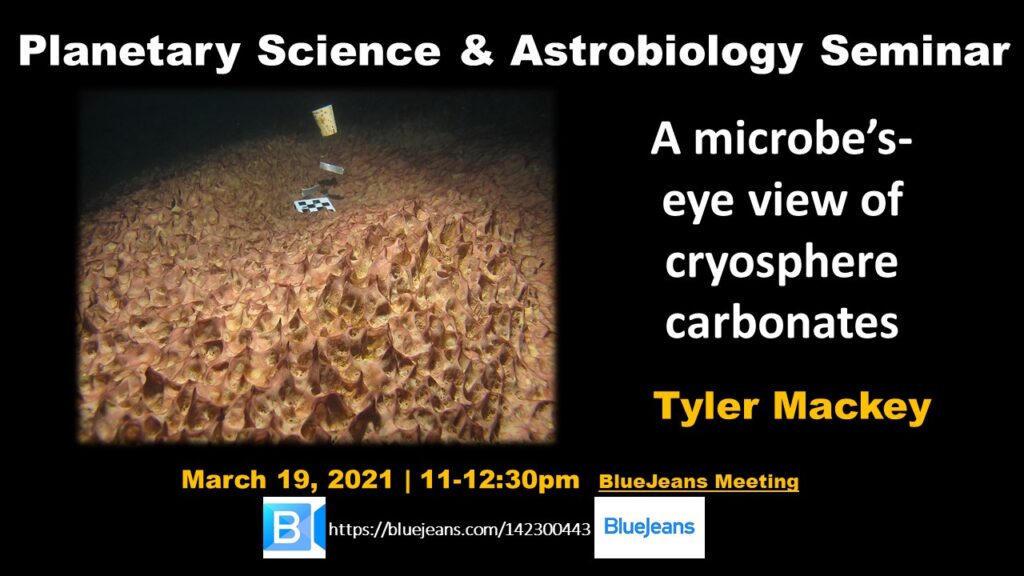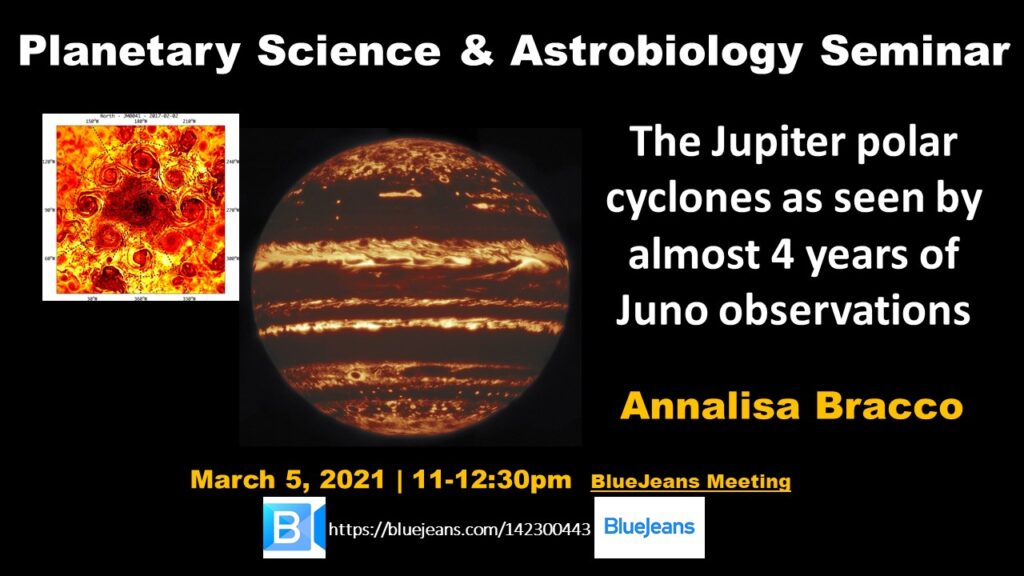Jacob Adler,
Postdoctoral Fellow at School of Earth & Atmospheric Sciences, Georgia Institute of Technology
PSAS: Reconstructing ancient biology to investigate the early evolution of nitrogen fixation
Amanda Garcia,
NASA Astrobiology Postdoctoral Fellow, Kacar Lab at the University of Arizona
CoS funding for GT Astrobiology!
PSAS: A microbe’s-eye view of cryosphere carbonates

The history of life on Earth is dominated by microbial communities, and aspects of their evolving
relationship with surface environments can be preserved by carbonates. In this talk, I focus on lakes
Joyce and Fryxell of the McMurdo Dry Valleys, Antarctica, to assess attributes of cryosphere
environments that influence microbial carbonates: namely ice cover, cold temperatures and
seasonality. Microbial mats in both of these lakes contain abundant carbonates, but differ in redox
chemistry and the degree of apparent biological influence on carbonate precipitation. Though such
cryosphere carbonates do not contribute significantly to the sedimentary record, these rare examples from modern environments provide necessary models for reconstruction of long term paleolake climate records and inform paleoenvironmental interpretations of ancient cryospheres like Snowball Earth episodes.
Tyler Mackey,
Assistant Professor at the University of New Mexico in the Department of Earth and Planetary Sciences
PSAS: Planetary Scale Microbial Dispersal
Earth’s atmosphere provides a thin barrier to the severe conditions of space. Globally, terrestrial microorganisms from our planet’s surface move through the blanketing atmosphere, analogous to how marine microbes drift through oceans. Whereas a century of exploration has allowed oceanographers to characterize marine life at nearly every depth, the same is not true for the “ocean” of air above our heads. High‐altitude exploration has been severely constrained by a shortage of reliable experimental systems. This seminar will discuss recent advances in the microbiological exploration of Earth’s atmosphere with the use of high-flying NASA aircraft and scientific balloons. Discoveries from these platforms are relevant to astrobiology in two fundamental ways: (1) Earth’s stratosphere is a natural laboratory for assessing the potential survivability of microbes on the surface of Mars which possesses a similar combination of conditions (high radiation levels and ultralow temperature, pressure & relative humidity); and (2) Methods for reliably collecting and detecting trace levels of microbial biomass at extreme altitudes can contribute to life detection strategies for other solar system targets.
David J. Smith
NASA microbiologist who founded the Aerobiology Laboratory at Ames Research Center
Congratulations to Maria Granada!
Congratulations to Maria Granada, our first Astrobiology Graduate Certificate recipient from Biological Sciences!
Read Maria’s sci comm project here.

PSAS: The Jupiter polar cyclones as seen by almost 4 years of Juno observations

The NASA spacecraft Juno discovered the circumpolar cyclone structures on Jupiter in 2017, and it has been monitoring their evolution ever since. These cyclones are organized in structures shaped like regular polygons. I will discuss the evolution of these structures as seen by Juno from February 2017 to November 2020 focusing on the data provided by the JIRAM instrument (Jovian InfraRed auroral mapper). Through these observations we have been able to monitor the properties, position and evolution of cyclonic and anticyclonic structures at latitudes above 80° both in the North and South poles of Jupiter.
Fundamental questions concerning Jovian cyclogenesis concern the formation mechanism and whether these cyclones are deep or shallow structures. JIRAM’s measurements show that any change in a structure is an extremely unlikely event on an annual scale, which has only happened once, and only temporarily in 2019. Neither the merging of two cyclones, nor the disappearing/creation of one stable cyclone has ever been observed.
Finally, I will discuss recent numerical studies relevant to both Jupiter and Saturn and how their results ‘fit’ JIRAM observations and possible steps forward to solve the deep – shallow conundrum.
Annalisa Bracco,
Professor School of Earth and Atmospheric Sciences, Georgia Institute of Technology
Congrats to Mirza Samnani!
ExplOrigins Recordings Available on new YouTube Channel!
PSAS: How to be a Space Science Advocate
Funding for space science is overwhelmingly provided by government—a product of public policy. Scientists have the ability and the opportunity to participate in the process of setting public policy through both direct and indirect means, such as supporting lobbying efforts by professional scientific organizations. The Planetary Society, a rare example of an independent pro-space nonprofit, actively engages in the process of policy development, working to support space science and exploration investment by the U.S. government. This talk will discuss why space policy is important and how future scientists can be effective space advocates for themselves and their field,
Casey Dreier,
Chief Advocate & Senior Space Policy Adviser The Planetary Society

